The Agony of Power – By Jean Baudrillard – A book review
You may know Jean Baudrillard even if you don't know him. He sort-of co-wrote The Matrix movie.
His book Simulacra and Simulation was inspiration for the dystopian blockbuster. And you can see Neo is hiding things in a copy of the book in the opening scene of the film:
Baudrillard is a pretty big deal in the relatively niche category of French Philosophers. But, before you get turned off by his dense phrasing, bleak visions, and complex nested ideas, it might be worth mentioning the rather endearing fact that Baudrillard was amused by his own theories and once gave a lecture on his work in Las Vegas –– wearing a gold lamé suit with mirrored lapels.
In the book I'm reviewing here, The Agony of Power, Baudrillard explains why power and intelligence are opposites. He argues that they cannot exist together. This book helped me understand why our world, sociopolitically, is fantastically fucked. I'll attempt to give a flavour of what this book contains. Here is a photograph of my copy:
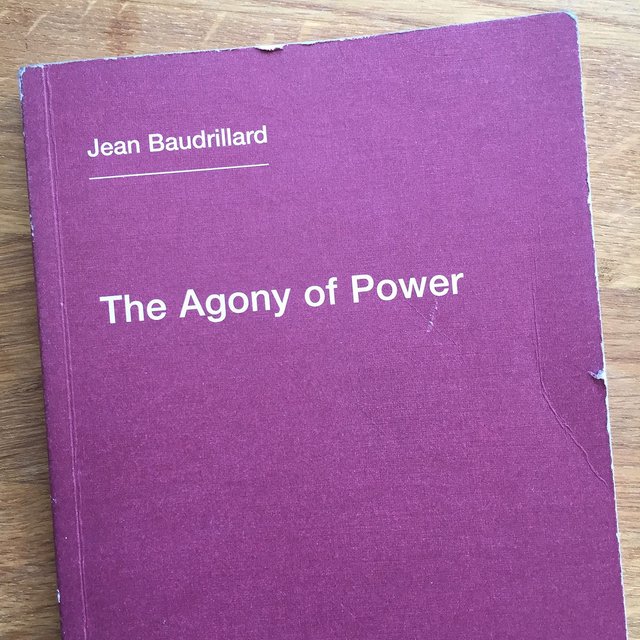
In The Agony of Power, Baudrillard deconstructs our current global situation to demonstrate that we, as societies, have internalised our own enslavement to the extent that we gate-keep our own prison cells. This might sound excessive at first. But, as always with Baudrillard, he has a pesky way of unveiling uncomfortable truths. Here's the back-cover:
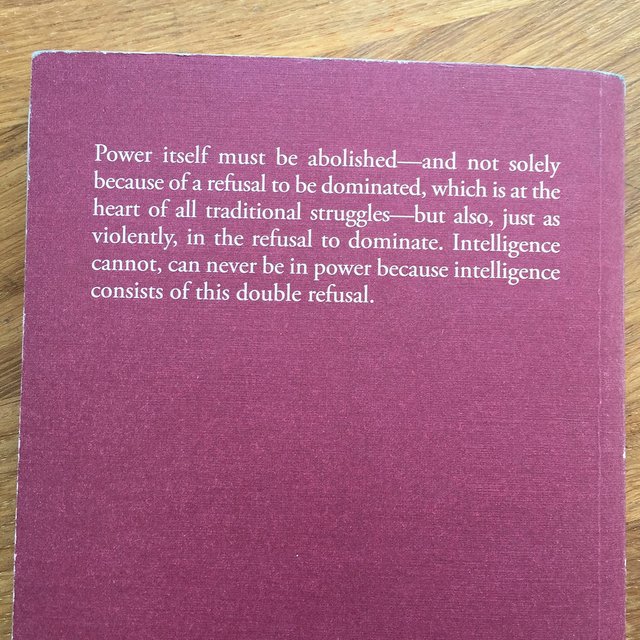
I will attempt to paraphrase Baudrillard's central arguments in this review. Here goes!
First, there is the distinction between domination and hegemony. Domination, Baudrillard says, is the old method of social control. But Hegemony is something new. Hegemony is when the system of control escapes the control of any single human or group and becomes systematised and internalised. For me, a good example of this might be our financial system. Presumably, once designed to serve us, we now serve it. In other words, our symbols have been turned against us. By us.
It reminded me of what Alan Watts observed of the Great Depression:
Remember the Great Depression of the Thirties? One day there was a flourishing consumer economy, with everyone on the up-and-up; and the next, unemployment, poverty and bread lines. What happened? The physical resources of the country – the brain, brawn, and raw materials – were in no way depleted, but there was a sudden absence of money, a so-called financial slump.
Complex reasons for this kind of disaster can be elaborated at length by experts on banking and high finance who cannot see the forest for the trees. But it was just as if someone had come to work on building a house and, on the morning of the depression, the boss had said, “Sorry, baby, but we can’t build today. No inches."“
Whaddya mean, no inches? We got wood, we got metal, we even got tape measures.”
“Yeah, but you don’t understand business. We been using too many inches and there’s just no more to go around.”
Baurdrillard writes:
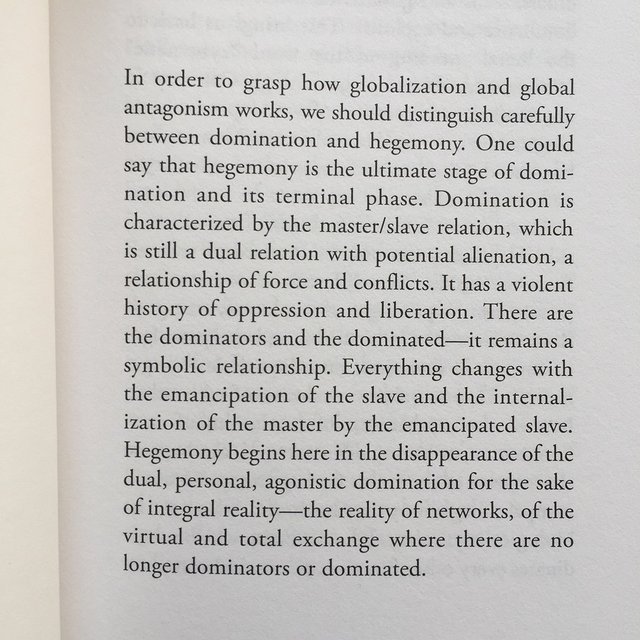
This is a process I, from a psychoanalytic perspective, would call Internalising the Perpetrator, or a kind of society-level version of the Stockholm Syndrome. But I also sense that Baudrillard means something much worse, more pervasive and harder to unravel than this. Not for the first time, I was reminded of Marshall McLuhan's observation that a fish cannot perceive the water it swims in because it knows no other environment to contrast it with.
I feel that Baudrillard is peering into our societal fish tank from a rare position outside it. This is the platform of all true philosophers.
Baurdrillard goes on to explain how our state of hegemony means that we cannot fight against power, because it is tangled up in us, and is, to some extent, us. We are in an awful spaghetti of mashed-up signs and mangled symbols. A situation where the powerful can exhibit the horrors of their operations in broad daylight because the signs we would use to topple it are broken and warped.
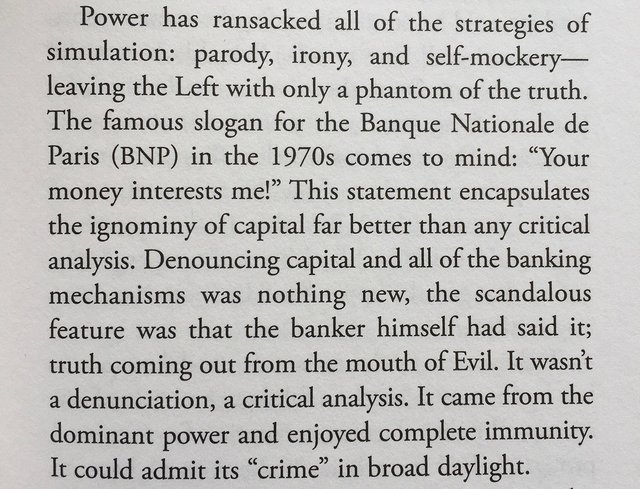
This made me think of occasions on which we did not react to abuses of power even when they were plain to see. For example, Snowden's revelations that the US is a rogue surveillance state; the discovery that the British Government and BBC were running a paedophile ring throughout the 1980s; The discovery and subsequent media-obfuscation of the paedophile ring that appears to be run by several of Clinton's campaign managers; The outlandishness of Trump who, regardless of your political nuances, is plainly a showman. Here to run a show.
Baudrillard seems to have a point: I have no idea how to resist power because it seems to be both everywhere, and immune to critique. Because there is apparently no critique it cannot admit to, reshape, and drive over.
When, for example, the British Broadcasting Corporation is known to have facilitated the rape of thousands of British children, and is not disbanded in the light of this information. What possible critique can stop power?
This is hegemony. The acceptance of any indignity that power can think to subject us to. And the internalisation of this position of powerlessness.
Baudrillard then goes onto look at terrorism.
Terrorism, he views as a self-perpetuating virus of thought. Something unleashed, like a piece of computer-code, into the mass consciousness of the world by a single iconic event (9/11) and then fuelled –– from that point on –– simply in fantasy and delusion. A ghost that haunts us endlessly because it is us:
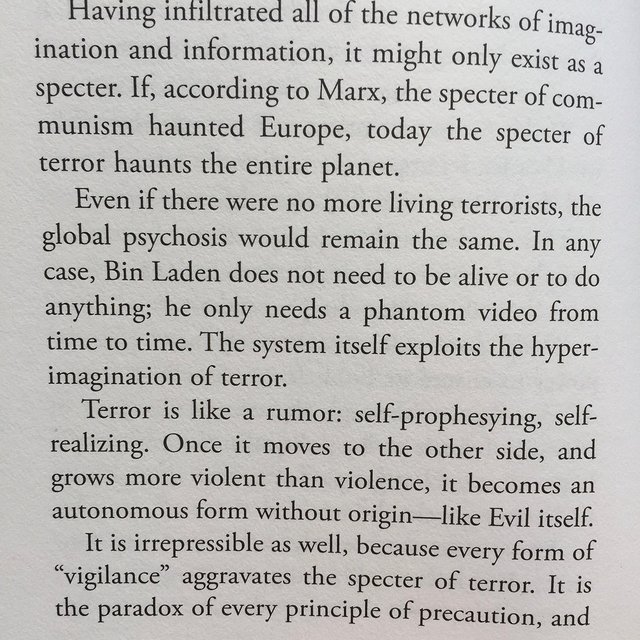
This process of terror being constructed from one key event and then rippling out under its own momentum is well-known to me from reading trauma theory. A ghost feeding a ghost feeding a ghost. In fact, it seems to echo Freud's concept of The Unconscious Compulsion to Repeat. Or, as the philosopher Slavoj Žižek puts it, things occur: First as tragedy, then as farce.
Published in 2007, The Agony of Power predated Trump's visions of a walled-in America by a decade, so it's interesting to read Baudrillard's thoughts on walls:

This is good news for anyone who objects to America constructing a wall along its borders. Because, paradoxically, the construction of a wall predicts the imminent collapse of the ideology or political system that built it. In other words: the more walls you build; the more you are collapsing.
There's so much more to say about The Agony of Power, but I feel like it's worth immersing yourself in it first-hand. Even if it kills you (it nearly killed me). I'll finish off this review by highlighting one more interesting passage in the book:
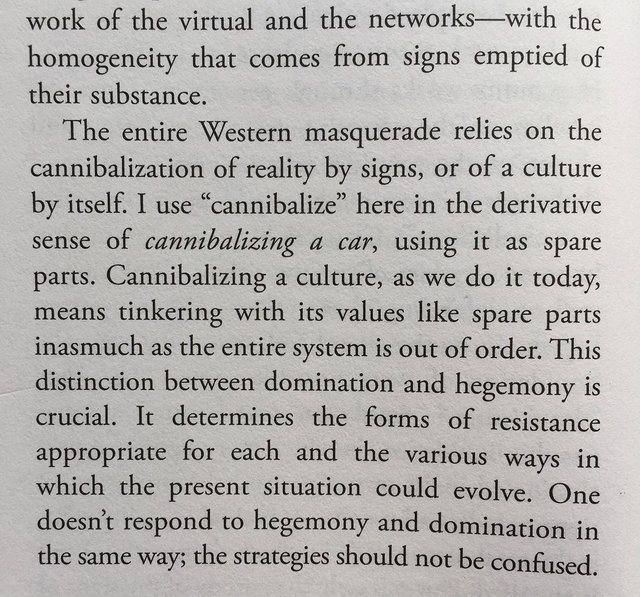
In the excerpt above, Baudrillard begins to touch on the theories he expands much further in the excellent (and overwhelming) Simulacra and Simulation. I want to cover that book in more detail in a forthcoming review, but suffice to say that Baudrillard thinks we are living in simulation of reality. Not a computer simulation (although that is an adequate metaphor), but one constructed in language.
This constructed reality is one where signs have become corrupt. We end up, as obvious examples, with paradoxical linguistic constructs like "Clean Coal" or "Extraordinary Rendition". Then we reach further and further into further linguistic abstractions when nations go to war with a noun. For example, "The War on Terror" in which people become reduced to nouns: "Terrorists".
None of these terms seem to mean anything concrete. But, instead, serve psychodynamically as a means of directing floating societal anger onto an object (in the object-relations sense) that is as far away as possible from the true object (society itself). I wrote more about his subject here: https://steemit.com/psychology/@matrjoschka/homeland-insecurity-the-psychological-origins-of-america-s-terrorism-fantasy-part-one
Baudrillard is not an easy author to read but maybe nothing that truly changes our minds is an easy experience. I'm excited to explore the rest of his work.
Hello @matrjoschka,
Congratulations! Your post has been chosen by the communities of SteemTrail as one of our top picks today.
Also, as a selection for being a top pick today, you have been awarded a TRAIL token for your participation on our innovative platform...STEEM.
Please visit SteemTrail to get instructions on how to claim your TRAIL token today.
If you wish to not receive comments from SteemTrail, please reply with "Stop" to opt out.
Happy TRAIL!

What an epic post, you sure deserve and upvote on this one! Thanks for sharing this French philosopher with us all here on Steemit, the group on this platform can definitely relate to this. I really appreciated your writing style and the design of your article as well.
All for one and one for all! Namaste :)
Thanks @eric-boucher, for reading; and for your compliments. I'm glad you enjoyed the piece. I plan to review another of Baudrillard's books, Simulacra and Simulation, soon.
I love Jean he really gives my mind a workout!
@reddust Yes! :)
Hi, I just read your post about microdose of LSD. It bring me a lot of questions about the process and results. You say LSD take you to a travel to the roots of your problem. But how was the process, and how deep you went and what deep mean. Also the profound changes in your live, from your relationship to your food habits. How the LSD allowed to recognize this needs. A very interesting personal work. Thanks for share. Greets from México.
Hi @garvofe,
Thanks for reading.
Your questions are deep! I will write a post about this soon, maybe this evening.
The LSD therapy process was long, and supported (initially) by experts. And 'deep' means, I went all the way back to perinatal experiences –– in other words, a complete processing of all unresolved emotional experiences from birth to present day. This is typical in psychedelic trauma therapy.
You might enjoy this book: https://www.goodreads.com/book/show/196571.LSD_psychotherapy
More soon!
Thank you @matrjoschaka.
Are you saying that the dominated has to fight the dominator but the hegemonated has to fight the hegemony?
Halfway through your article I was thinking of how black celebrities are more likely to thank a super-being for their successes than white people, perhaps because during their ancestors' slavery, a super-being was the only hope they had in an unliveable situation. Is it true that they have perhaps internalised the dominance of organised religion and it has become hegemony by way of meme? I'm trying to find a foothold on this theory and terminology.
Thanks for interesting questions, @lenskonig. Good to see you back in the Steem room.
I'm trying to present Baudrillard's view more than my own, but as to your question about who the hegemonated (!) have to fight. I think it might be more about who they have to stop fighting: Themselves in shadow aspect.
Dialogue is the opposite of violence. (I have a feeling Marshall McLuhan said that).
My personal feeling is that we've reached such a deep level of simulacra (and simulation) that the way back to peace, globally, requires the kind of extreme intervention presented metaphorically in The Matrix movie. In other words, for us each to take some kind of pill, agree to wake up in the truth of our situation (being plugged into a mechanistic system of hegemony), face this truth, and find our way back to something real.
Of course, to many people this will sound like an absurd exaggeration of our situation here on planet earth. But many prisons do not have walls. They are inside us. And to escape one, and look back in, it is often a surprise to see what was unseen while trapped in our cell: To see the cell walls.
As for deference to superbeings. I'm not sure that's a problem per se, because there can be such variance in the way in which this is done. At the brighter end of the spectrum, a person could invent a personal god, acknowledge that god was an aspect of them, and gently project this symbolic figure out as a hopeful beacon of their own true, inner nature.
On the other hand, a lot of organised religion is a trauma-containment mechanism and requires deference to external superbeings who are judgemental and angry. Obviously, almost everyone now knows that this position is pure projection of the negative aspects of a person's parents onto a symbol, to avoid facing the painful memory of some childhoods. http://www.gregmogenson.com/GOD%20intro.pdf